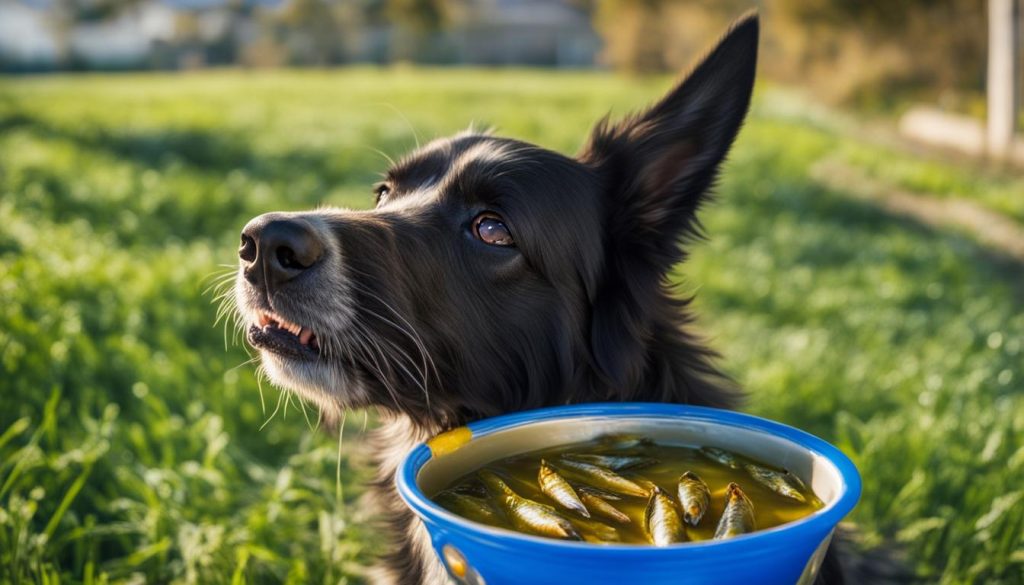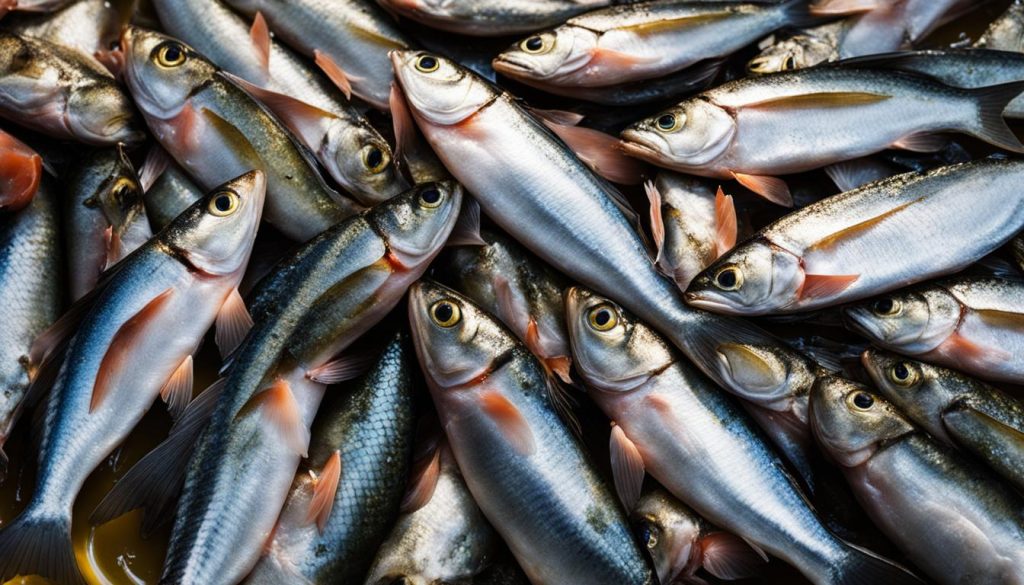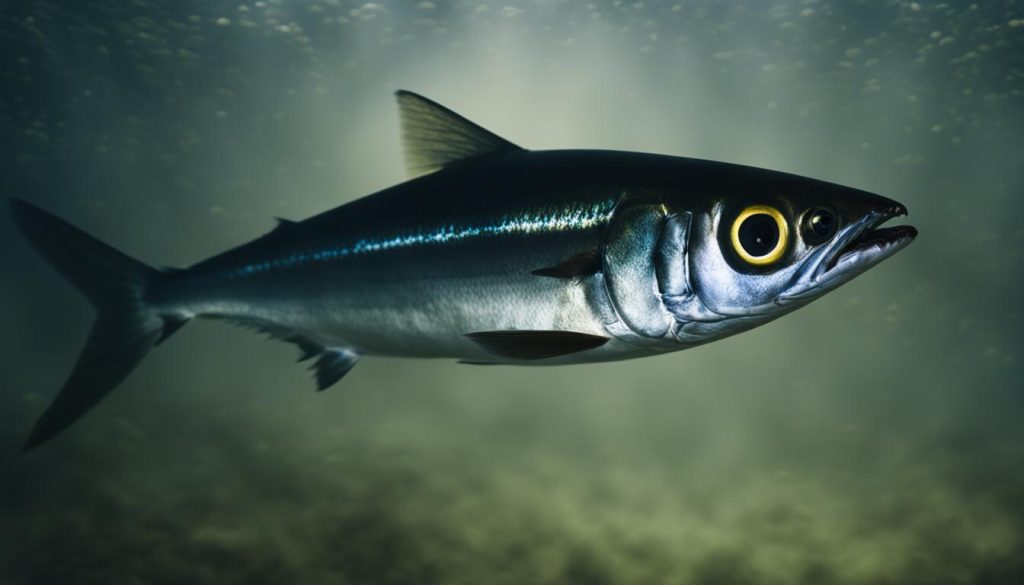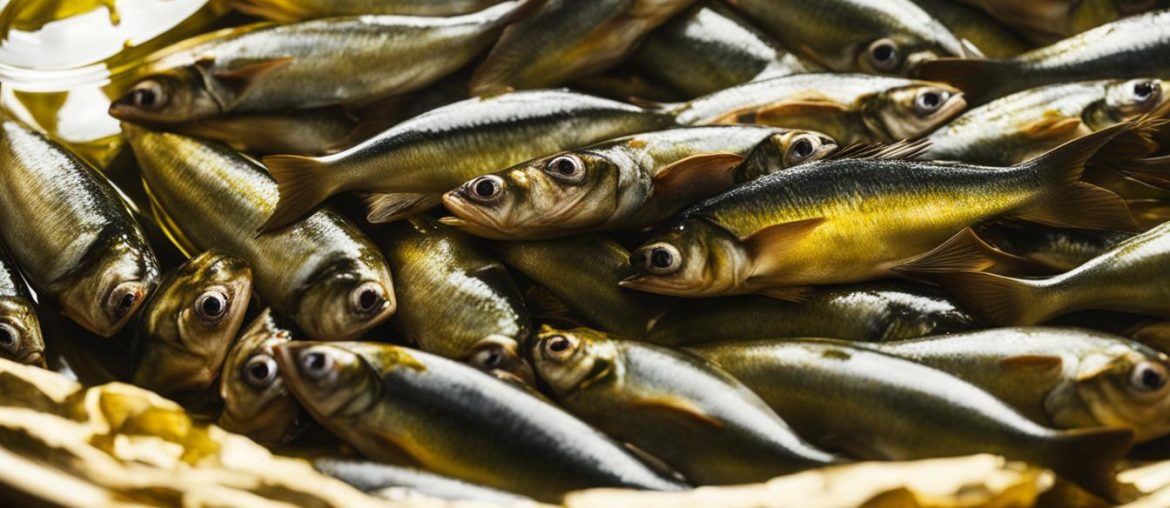As a pet nutrition expert, I often get asked if dogs can consume sardines in olive oil. In this comprehensive guide, I’ll provide you with all the information you need to know about feeding sardines to your furry friend.
Sardines are not only a tasty treat but also packed with essential nutrients that can benefit your dog’s overall health. They are an excellent protein source, rich in omega-3 fatty acids, Vitamin B12, Vitamin D, calcium, and selenium. However, it’s crucial to understand the potential risks and considerations when incorporating sardines into your dog’s diet.
Before you start adding sardines to your dog’s meal plan, it’s always best to consult with a veterinarian. They can advise you on the appropriate amount of sardines to feed your dog based on their size, weight, and specific dietary needs. Let’s dive further into the topic and explore the benefits, safety precautions, and best practices for feeding sardines to dogs.
Key Takeaways:
- Sardines are a nutritious protein source for dogs, providing essential nutrients like omega-3 fatty acids, Vitamin B12, and calcium.
- Consult with a veterinarian to determine the appropriate amount of sardines to feed your dog based on their individual needs.
- Feeding sardines in moderation is key to avoid potential health risks and ensure a balanced diet for your dog.
- Avoid feeding sardines packed in olive oil, as the high-fat content can lead to weight gain and other health issues.
- Always remove the bones from sardines before feeding them to your dog to prevent choking hazards and intestinal injuries.
Are Sardines Good For Dogs?

Sardines are a highly beneficial food for dogs, offering a range of essential nutrients that promote overall health and well-being. These small fish are packed with protein, omega-3 fatty acids, vitamins, and minerals, making them a nutritious addition to a dog’s diet.
The nutritional value of sardines for dogs is significant. The high protein content helps support muscle development and repair, while omega-3 fatty acids, such as EPA and DHA, contribute to a healthy coat, skin, and joints. Sardines are also rich in Vitamin B12, which aids in red blood cell production and nerve function, and Vitamin D, which assists in calcium absorption, promoting strong bones and teeth.
In addition, sardines provide important minerals like calcium and selenium. Calcium is essential for various bodily functions, including muscle contraction and blood clotting, while selenium acts as a powerful antioxidant, supporting immune system function and protecting cells from damage.
Are Sardines Safe for Dogs?

Sardines can be a healthy and nutritious addition to a dog’s diet when fed in moderation. However, there are certain conditions and risks to consider before incorporating sardines into your dog’s meals. It is crucial to prioritize your dog’s well-being and consult with a veterinarian before making any dietary changes. Some key factors to consider include:
- Feeding in Moderation: While sardines offer numerous health benefits, they are also high in fat. Overfeeding sardines can lead to weight gain and digestive issues. It is essential to determine the appropriate portion size for your dog based on their size, age, and activity level.
- Health Conditions: Certain health conditions, such as diabetes, obesity, pancreatitis, or kidney disease, may require specific dietary restrictions. Dogs with these conditions may need to avoid or limit sardine consumption. Consult with your veterinarian to determine if sardines are safe for your dog’s specific health needs.
- Quality and Preparation: When feeding sardines, it is important to choose high-quality sources. Look for sardines that are packed in water rather than olive oil or tomato sauce, as these can contain additional ingredients that may be harmful to dogs. Additionally, always remove any bones from the sardines to prevent choking hazards.
By considering these factors and working closely with your veterinarian, you can ensure that feeding sardines to your dog is done safely and in a way that supports their overall health and wellness.
Can Dogs Eat Sardines in Olive Oil?

Sardines are a popular choice for dog owners looking to provide their pets with a nutritious and tasty treat. However, when it comes to feeding dogs sardines, it’s important to consider the type of oil they are packed in. While sardines in olive oil may seem like a tempting option, it is not recommended to feed dogs sardines in olive oil due to the high fat content.
The additional fat from the olive oil can lead to weight gain and other health issues in dogs. It is best to choose sardines packed in water instead. Water-packed sardines still provide all the nutritional benefits without the added fat, making them a safer and healthier option for your furry friend. Remember to always read the labels and opt for plain water-packed sardines when feeding them to your dog.
Alternatively, if you’re looking to add some flavor to your dog’s sardine treat, you can try mixing the plain water-packed sardines with a small amount of olive oil. This way, you can control the amount of oil your dog consumes and still provide them with a tasty and nutritious snack. Just ensure that the overall fat content is moderate and does not exceed your dog’s dietary needs.
Feeding your dog sardines can be a healthy addition to their diet, but it’s crucial to make informed choices and consider their overall nutritional needs. By opting for water-packed sardines instead of those packed in olive oil, you can ensure that your dog receives the benefits of sardines without the potential risks associated with excessive fat consumption. Always consult with your veterinarian before making any changes to your dog’s diet to ensure their health and well-being.
Can Dogs Eat Sardines With Bones?
Sardines are a popular choice for dog owners looking to add variety and nutrition to their pet’s diet. However, when it comes to feeding sardines to dogs, one important consideration is whether or not the sardines contain bones. While dogs can safely consume sardine bones when they are properly prepared, it is generally recommended to remove the bones before feeding them to your furry friend.
Dogs have strong jaws and teeth, but sardine bones can be small and sharp, posing a potential choking hazard or causing intestinal blockage if swallowed. To ensure the safety of your dog, it is best to remove all bones from sardines before feeding them. This can be done by either purchasing boneless sardines or manually removing the bones yourself.
Here’s a step-by-step guide on how to remove bones from sardines:
- Place the sardine on a clean surface.
- Gently press down on the sardine with your fingers or a fork to expose the bones.
- Use your fingers or a pair of tweezers to carefully remove the bones, one by one.
- Inspect the sardine to ensure all bones have been successfully removed.
- Repeat the process for each sardine before feeding them to your dog.
By taking the time to remove the bones from sardines, you can help prevent any potential harm or discomfort to your dog. Remember to always consult with your veterinarian before making any changes to your dog’s diet or introducing new foods.
| Bones in Sardines | Recommended |
|---|---|
| With bones | No, remove the bones to ensure safety |
| Boneless | Yes, boneless sardines are safe to feed to dogs |
Should I Worry About Mercury in Sardines?

Sardines are a popular choice for dog owners looking to incorporate a nutritious source of protein and essential nutrients into their pet’s diet. However, one concern that may arise is the presence of mercury in sardines and the potential risks it poses to dogs’ health. To address this concern, it is crucial to understand the levels of mercury in sardines and the impact it can have on our canine companions.
When it comes to mercury levels in sardines, the good news is that sardines are a low-level predator fish, meaning they are lower on the food chain and accumulate less mercury compared to larger fish species. This makes sardines a safe choice for dogs in terms of mercury poisoning. However, as with any food, moderation is key.
It is important to note that the small amount of mercury present in sardines is considered safe for dogs when consumed in appropriate quantities. The body of a healthy dog can naturally eliminate and process these low levels of mercury without any adverse effects. By feeding sardines in moderation and as part of a balanced diet, pet owners can provide their dogs with the numerous health benefits sardines offer without worrying about mercury toxicity.
To sum up, the low levels of mercury found in sardines make them a safe and nutritious addition to a dog’s diet. As long as sardines are fed in moderation, dogs can enjoy the many benefits these little fish have to offer, such as omega-3 fatty acids, vitamins, and minerals. Always consult with a veterinarian to determine the appropriate amount of sardines to include in your dog’s diet based on their specific needs and health conditions.
Risks of Feeding Dogs Sardines

Feeding sardines to dogs can provide numerous benefits, but it is important to be aware of the potential risks associated with their consumption. One of the main concerns is the high-fat content in sardines. While fats are essential for a dog’s health, excessive fat intake can lead to weight gain and obesity, which can increase the risk of various health issues.
Additionally, some dogs may have sensitive stomachs or a history of digestive issues. The rich and oily nature of sardines can cause gastrointestinal upset, including diarrhea or vomiting, in these dogs. It is crucial to monitor your dog’s tolerance and adjust the portion size accordingly.
Another potential health issue is the presence of heavy metals, such as mercury, in certain fish species, including sardines. While sardines have low mercury levels compared to larger fish, it is still important to feed them in moderation to avoid any adverse effects. Consult with your veterinarian to determine the appropriate frequency and quantity of sardines for your dog’s specific needs.
| Risks of Feeding Sardines to Dogs | Potential Health Issues |
|---|---|
| High-fat content | Weight gain, obesity, increased risk of health issues |
| Gastrointestinal upset | Diarrhea, vomiting, digestive discomfort |
| Heavy metals | Potential exposure to mercury |
It is important to note that while sardines can be a healthy addition to a dog’s diet, they should not be the sole source of nutrition. Dogs require a balanced diet that includes a variety of protein sources, carbohydrates, and other essential nutrients. Always consult with a veterinarian before making any significant changes to your dog’s diet.
How to Feed Dogs Sardines
When it comes to incorporating sardines into your dog’s diet, it’s important to determine the right amount and establish a proper feeding routine. Consult with a veterinarian or a professional nutritionist to ensure that you’re providing the appropriate quantity of sardines based on your dog’s size, energy level, and specific dietary needs.
Start by introducing small amounts of sardines into your dog’s meals and observe any reactions or tolerance. Gradually increase the portion size over time while monitoring your dog’s weight and overall health. Remember, sardines should make up no more than 10% of your dog’s daily calorie intake, so be mindful of their nutritional balance.
You can incorporate sardines into your dog’s diet in various ways. You can offer them as a special treat or mix them into their regular food. Some pet owners find it helpful to mash the sardines and mix them with other ingredients to create a homemade meal or use them as a delicious topper for kibble. This way, you can enhance the nutritional value of your dog’s meals while adding a tasty and nutritious treat.
Remember, every dog is unique, and their dietary requirements may vary. It’s essential to tailor the feeding of sardines to your individual dog’s needs under the guidance of a veterinary professional to ensure they are receiving a balanced and healthy diet.
Can Dogs Eat Sardines in Tomato Sauce?
Sardines in tomato sauce may seem like a flavorful option for dogs, but it’s best to avoid feeding them to your furry friend. While sardines themselves can be a nutritious addition to a dog’s diet, tomato sauce often contains added ingredients, such as salt, spices, and preservatives, that can be harmful to dogs. It’s important to prioritize your dog’s safety and stick to plain sardines packed in water.
Feeding sardines in tomato sauce to dogs can expose them to unnecessary risks. Certain ingredients found in tomato sauce, like onions and garlic, can be toxic to dogs, causing gastrointestinal upset or even more severe complications. Additionally, the high salt content in tomato sauce can contribute to dehydration and negatively impact a dog’s overall health.
To ensure your dog receives the nutritional benefits of sardines without any potential risks, opt for plain sardines packed in water. These provide the same protein, omega-3 fatty acids, and essential vitamins and minerals without the added ingredients found in tomato sauce.
Summary:
- Sardines in tomato sauce should be avoided when feeding dogs.
- Tomato sauce often contains harmful ingredients such as salt, spices, and preservatives.
- These added ingredients can be toxic to dogs and negatively impact their health.
- Stick to plain sardines packed in water to ensure your dog’s safety and well-being.
Can I Feed My Dog Fish Everyday?

Feeding fish to dogs can provide several health benefits due to its high protein content and omega-3 fatty acids. Fish is known to promote healthy skin and coat, support brain function, and reduce inflammation in dogs. However, it is not recommended to feed fish to dogs every day as it may lead to certain risks and nutritional imbalances.
While fish is a great addition to a dog’s diet, it should be part of a balanced meal plan. Dogs require a mix of proteins, carbohydrates, fats, vitamins, and minerals from various sources to meet their nutritional needs. If fish is the only protein source in a dog’s diet, it may cause an imbalance in other essential nutrients.
Additionally, some types of fish may contain higher levels of mercury or other contaminants, which can be harmful to dogs if consumed in large quantities over time. To ensure your dog receives the benefits of fish without the associated risks, it is best to incorporate fish into their diet on a rotational basis and seek guidance from a veterinarian or a knowledgeable pet nutritionist.
A balanced diet for dogs should include a variety of proteins such as lean meats, poultry, and fish, along with appropriate amounts of carbohydrates and fats. This approach ensures that your dog receives all the necessary nutrients for optimal health and wellbeing. Remember to consult with a professional to determine the best feeding plan for your dog based on their individual needs and health status.
Wrapping Up
After careful consideration, it is clear that sardines can be a valuable and nutritious addition to a dog’s diet. They offer a host of essential nutrients, including protein, omega-3 fatty acids, and important vitamins and minerals. However, it is crucial to feed sardines to dogs in moderation.
Feeding sardines as part of a balanced diet can provide numerous benefits for dogs, such as improved heart health, reduced inflammation, and support for the immune system. Consulting with a veterinarian is essential to determine the appropriate amount of sardines for your dog, taking into account their size, energy level, and specific dietary needs.
While sardines in olive oil may seem convenient, it is best to avoid this option due to the high fat content. Opt for sardines packed in water instead. Additionally, it’s important to remove all bones from the sardines to prevent any choking hazards or injury to your dog’s intestines. Lastly, consider your dog’s individual health conditions and watch for signs of weight gain or digestive issues when incorporating sardines into their diet.
To sum up, sardines can be a nutritious and beneficial treat for dogs when fed in moderation, but it’s crucial to prioritize their overall health and consult with a veterinarian. By taking these precautions, you can safely enjoy the benefits that sardines offer for your furry friend.
FAQ
Can dogs eat sardines in olive oil?
It is not recommended to feed dogs sardines in olive oil due to the high fat content. Choose sardines packed in water instead.
Are sardines good for dogs?
Sardines are rich in protein, omega-3 fatty acids, Vitamin B12, Vitamin D, calcium, and selenium, making them a beneficial addition to a dog’s diet.
Are sardines safe for dogs?
Sardines are generally safe for dogs in moderation. However, dogs with certain health conditions may need to avoid or limit sardine consumption. Consult with a veterinarian for guidance.
Can dogs eat sardines with bones?
It is best to remove all bones from sardines before feeding them to dogs to prevent choking hazards or potential harm to the intestines.
Should I worry about mercury in sardines?
Sardines are low on the food chain and do not accumulate significant amounts of mercury, so pet owners do not need to worry about mercury poisoning when feeding sardines to dogs.
What are the risks of feeding dogs sardines?
Feeding sardines to dogs in excess can lead to weight gain, digestive issues, and other health problems. Dogs with certain medical conditions should avoid sardines. Monitor your dog’s weight and overall health when feeding sardines.
How should I feed dogs sardines?
Work with a veterinarian to determine the appropriate amount of sardines based on your dog’s size, energy level, and dietary needs. Sardines should make up no more than 10% of a dog’s daily calorie intake and can be given as a treat or mixed into their regular food.
Can dogs eat sardines in tomato sauce?
It is best to avoid feeding dogs sardines in tomato sauce as it often contains added ingredients that can be harmful to dogs. Stick to plain sardines packed in water for your dog’s safety.
Can I feed my dog fish everyday?
Fish can be a beneficial addition to a dog’s diet, but it should not be the sole source of their nutrition. Dogs require a balanced diet from a variety of sources to ensure they receive all necessary nutrients.






